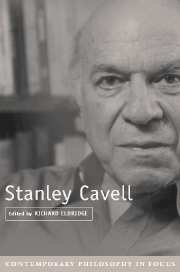Book contents
- Frontmatter
- Contents
- List of Contributors
- Stanley Cavell
- 1 Introduction: Between Acknowledgment and Avoidance
- 2 Stanley Cavell and Ethics
- 3 The Names of Action
- 4 Stanley Cavell's Vision of the Normativity of Language: Grammar, Criteria, and Rules
- 5 Aesthetics, Modernism, Literature: Cavell's Transformations of Philosophy
- 6 A Second Primavera: Cavell, German Philosophy, and Romanticism
- 7 Cavell on American Philosophy and the Idea of America
- 8 “Disowning Knowledge”: Cavell on Shakespeare
- 9 Cavell on Film, Television, and Opera
- Brief Annotated Bibliography of Works by and about Stanley Cavell
- Index
2 - Stanley Cavell and Ethics
Published online by Cambridge University Press: 08 January 2010
- Frontmatter
- Contents
- List of Contributors
- Stanley Cavell
- 1 Introduction: Between Acknowledgment and Avoidance
- 2 Stanley Cavell and Ethics
- 3 The Names of Action
- 4 Stanley Cavell's Vision of the Normativity of Language: Grammar, Criteria, and Rules
- 5 Aesthetics, Modernism, Literature: Cavell's Transformations of Philosophy
- 6 A Second Primavera: Cavell, German Philosophy, and Romanticism
- 7 Cavell on American Philosophy and the Idea of America
- 8 “Disowning Knowledge”: Cavell on Shakespeare
- 9 Cavell on Film, Television, and Opera
- Brief Annotated Bibliography of Works by and about Stanley Cavell
- Index
Summary
INTRODUCTION
Academic philosophy in the twentieth century has become comfortable with a compartmentalized conception of philosophy. Most members of philosophy departments in American universities consider themselves to be specialists in, for example, philosophy of language, or philosophy of mind, or philosophy of science or ethics or aesthetics, or in some period of the history of philosophy, and this is, mostly, a good thing. It permits a detailed mastery of a limited, often technical, body of work, to which one might reasonably aspire to make a small contribution in a sophisticated way. Given the proliferation of the philosophical literature in all fields, and given the need in many specialized areas to master some other academic field (contemporary physics, neuroscience, computer science, economics, art history), this all makes good sense. This is what Richard Rorty calls the conception of philosophy as a Fach – a specialized discipline that masters a particular body of knowledge. No wonder that it has been difficult for academic philosophy to assimilate the work of Stanley Cavell. On the one hand, Cavell is widely read, admired, and honored by the philosophical profession. He has received its highest marks of professional recognition: selection to deliver the Carus Lectures, the presidency of the Eastern Division of the American Philosophical Association, a MacArthur Fellowship. On the other hand, for many academic philosophers he represents a kind of stumbling block. They don't know how to fit him into the standard pictures of twentieth-century analytical and Continental philosophy.
- Type
- Chapter
- Information
- Stanley Cavell , pp. 15 - 47Publisher: Cambridge University PressPrint publication year: 2003
- 5
- Cited by

